No Comment
 |
| Google Images |
The Pharisees and religious leaders of Jesus’ day illustrate the problem. Twice in Matthew 21 we find them caught on the horns of a dilemma. In Matthew 21:23 to 27, they question by whose authority Jesus speaks. When He returns the favour by asking them whether or not John’s baptism was heaven-sent or a clever fraud, they don't know how to answer.
The Pharisees decide that whichever answer they give would get them into trouble with someone, so they decide to sit on the fence and make no statement at all.
At the end of Matthew 21 a similar situation arises. The religious leaders are quite annoyed at Jesus. The parables He told and the messages He delivered were often directed at them and they resented the bad light that Truth shed on them. But Matthew 21:46 says: “They looked for a way to arrest him, but they were afraid of the crowd because the people held that he was a prophet.”
We are reminded of John 3 where we are told that Nicodemus, a teacher of the law, came to Jesus at night so that no one would see him talking theology with Jesus. You couldn’t “vote your conscience” when you belonged to these particular parties unless you were willing to pay the price. Sounds much like our political parties today where members are required to maintain the party line no matter what they might personally believe—or else!
But whether the pressure came from inside or from outside, the Pharisees had to make a decision as to what they would believe and what they would do about their beliefs. So do we. Are we afraid of what people might say if we take a stand for Truth? Are we worried that we might lose some friends, some status, some reputation if we make an unpopular decision or resist that, “herd-mentality?” Is our obedience to the Lord more important than our conformity to the world around us?
Sometimes we believe that making no decision is better than making the wrong decision. But often our struggle with decision-making is not a question of whether or not the decision is wrong, but whether or not the decision is “safe.” Like the Pharisees and the religious leaders of the day, we prefer safe to right and we prefer safe to the possibility of having to rectify whatever damage might be done by making a wrong decision. Few of us realize that making no decision IS a decision. We don’t consider that there could be as many consequences to making no decision as there can be to making a wrong decision, or even a right one.
For the believer, Proverbs 3:3-7 is basic to good decision-making. “Let love and faithfulness never leave you; bind them around your neck, write them on the tablet of your heart. Then you will win favor and a good name in the sight of God and man. Trust the Lord with all your heart and lean not on your own understanding; in all your ways acknowledge him, and he will make your paths straight. Do not be wise in your own eyes; fear the Lord and shun evil.”
When He makes the decision, it's always right—no matter what the consequences.



Comments
Post a Comment